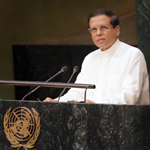HUMAN RIGHTS
Sri Lanka rejects UN call for foreign judges in war probe

Colombo, Sri Lanka | AFP | Sunday 3/5/2017 – Sri Lankan President Maithripala Sirisena has rejected a fresh appeal from the United Nations to allow international judges to investigate alleged war-era atrocities, vowing to not prosecute soldiers.
“I am not going to allow non-governmental organisations to dictate how to run my government. I will not listen to their calls to prosecute my troops,” the president said, in remarks distributed by his office Sunday.
The UN on Friday criticised Sri Lanka’s “worryingly slow” progress in addressing its wartime past, urging the government to adopt laws allowing for special hybrid courts to try war criminals.
In his first remarks since the UN Human Rights Council in Geneva handed down a new scorecard on Sri Lanka, Sirisena rebuffed calls for international judges to probe abuses committed during the island’s 37-year civil war.
Sri Lanka has resisted calls to establish a special court to investigate allegations that government forces killed up to 40,000 Tamil civilians in the final months of fighting, which ended in May 2009.
Sirisena, a member of the majority Sinhalese community, received the support of the Tamil minority after promising accountability for excesses carried out by the largely Sinhalese military.
He had agreed to a UN Human Rights Council resolution in October 2015, which called for special tribunals and reparations for victims, and gave Sri Lanka 18 months to establish credible investigations.
But the deadline lapsed without those commitments being met.
The UN said coalition politics in the unity government Sirisena formed after ousting former strongman leader Mahinda Rajapaksa were likely to blame for the slow pace of progress.
Last week, the main Tamil political party accused Sirisena of failing to deliver on his promises and urged the UN to hold his administration to account.
Sirisena’s response marks a sharp shift in his policy towards accountability and reconciliation, which had earned him the praise of international observers.
“A charge sheet is now brought against our forces with a demand to include foreign judges to try them,” he said, in a speech to troops in the northern peninsula of Jaffna, the Tamil heartland.
The defiant tone contrasted with his Foreign Minister Mangala Samaraweera, who asked the Human Rights Council for more time, promising that his country remained committed to seeking justice.
At least 100,000 people were killed during the separatist war between government forces and rebels from the Tamil Tigers group with atrocities recorded by both sides.
In its report, the UN said abuses including torture remain widespread in the ethnically divided island nation of 21 million with “a prevailing culture of impunity” partly to blame.
The UN acknowledged that Colombo had made some positive advances on constitutional and legal reforms, limited land restitution and symbolic gestures towards reconciliation.
But it cautioned that the measures taken so far had been “inadequate, lacked coordination and a sense of urgency.”




